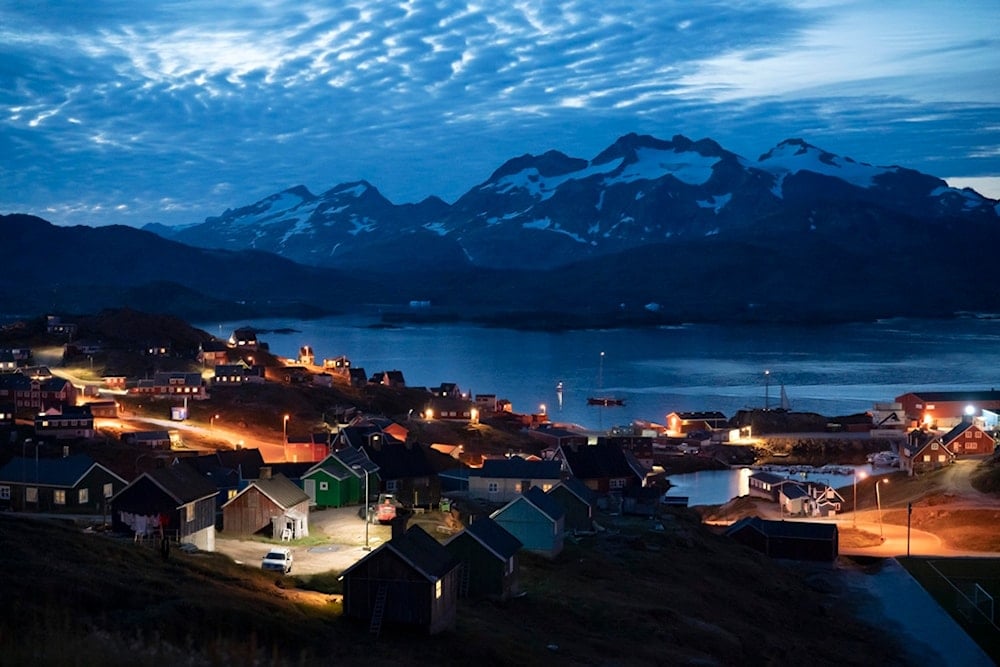Trump allies running influence campaign in Greenland: Report
Reports from Izvestia and Denmark’s DR say allies of US President Donald Trump are running an influence campaign in Greenland to shift public opinion toward US control.
-

Homes are illuminated after the sunset in Tasiilaq, Greenland, Friday, August 16, 2019. (AP Photo/Felipe Dana, File)
An exclusive report published Sunday on Russian news website Izvestia says the idea of US President Donald Trump annexing Greenland has resurfaced, with Danish officials accusing Washington of running an "influence campaign" to sway the Arctic island's population.
Denmark's public broadcaster DR reported that figures close to Trump have been active in Greenland for several years, cultivating ties with influential locals and compiling lists of citizens deemed friendly or hostile toward the United States. The aim, sources alleged, was to prepare the ground for Greenlanders to "switch to the American side."
Danish Foreign Minister Lars Løkke Rasmussen summoned the US chargé d'affaires last week, warning that "a campaign of foreign influence in Greenland with Washington's support would be contrary to all international rules."
Greenland's Prime Minister Jens-Frederik Nielsen echoed that sentiment, calling such efforts "unacceptable" and adding, "If you think you can easily influence the Greenlanders, then it won't work. We are allies, and we need to be treated with respect, just like others."
Greenland influence campaign
According to DR, the strategy allegedly involves three stages: first, efforts to win local sympathy through visits, such as one by Donald Trump Jr. earlier this year in Nuuk; second, pressure on Denmark from senior US officials, including Vice President JD Vance, who in March criticized Copenhagen during a visit to the American Pituffik base in Greenland; and finally, deeper infiltration into Greenlandic society to shape public opinion.
It remains unclear whether these activities are directed by Trump himself or undertaken independently by allies, though concerns have grown since one of his close associates assumed a post with potential influence over US security policy.
The allegations come alongside remarks from Secretary of State Marco Rubio, who argued in April that "Denmark should accept the fact that the island wants to gain independence" while stressing that Washington would not permit China to dominate Greenland's economy. His comments reinforced the perception that Trump's administration is sympathetic to Greenlandic independence and sees the island as strategically valuable.
Read more: China stresses adherence to UN Charter after Trump's Greenland remarks
Adding to the sensitivity, Danish Prime Minister Mette Frederiksen recently issued an official apology to Greenlanders subjected to forced contraception in the 1960s, acknowledging systemic discrimination. The timing of the apology, coinciding with reports of US influence operations, indicate the complicated legacy of Copenhagen's relationship with the island.
Resource Struggle
Analysts told Izvestia that Washington's interest goes beyond geopolitics, pointing to Greenland's rich deposits of critical minerals, especially rare earths, essential for advanced technologies. With China currently controlling over 70% of global rare earth production, US officials view Greenland's resources as crucial for supply chain security.
Together, the allegations of covert influence, Rubio's statements, and growing competition over Arctic resources have injected new strain into US-Danish relations, reviving Trump's idea of bringing Greenland closer to Washington's orbit.

 3 Min Read
3 Min Read










